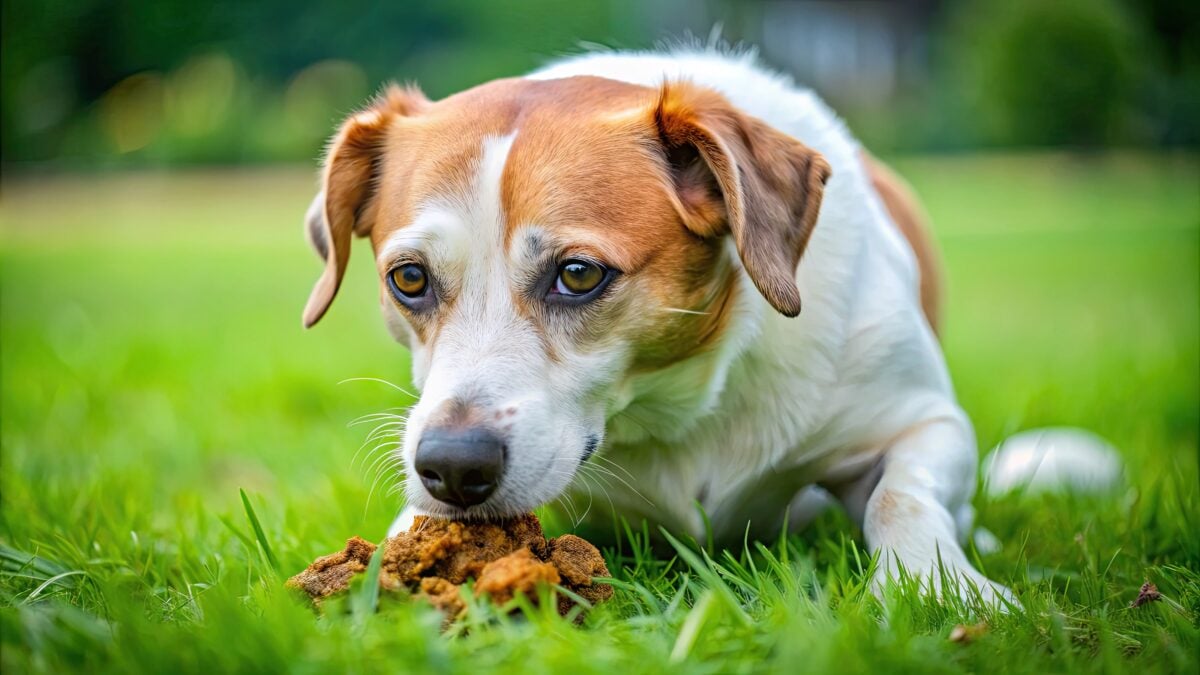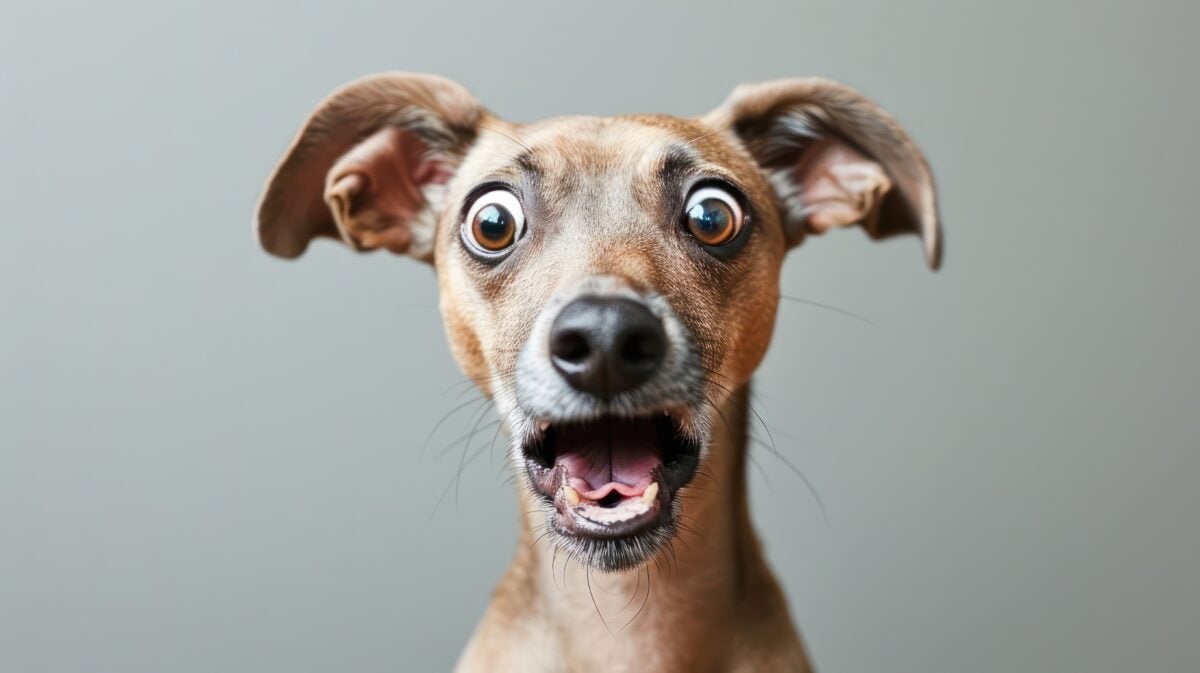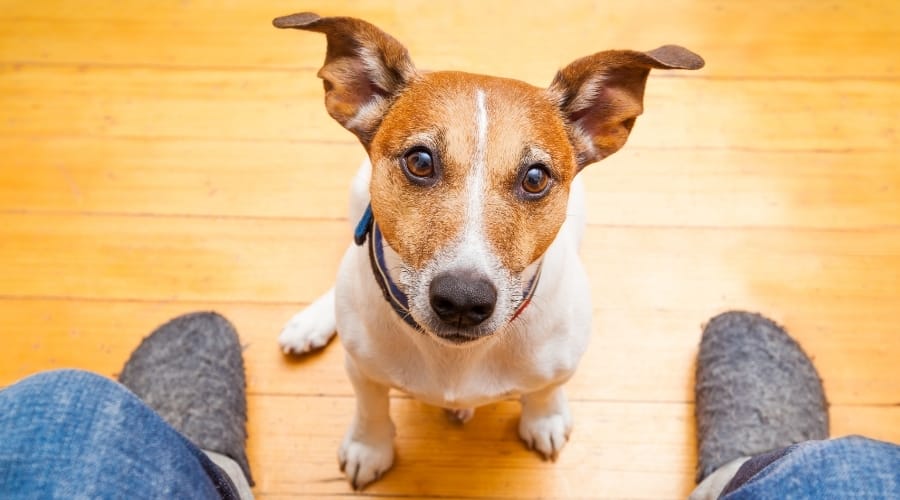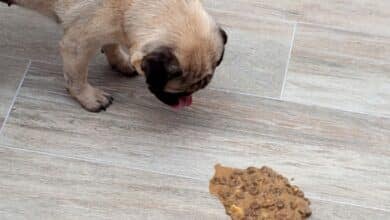How To Stop Dog Eating Poop – Home Remedies That Feel Like A Miracle
When you purchase through links on our site, we may earn a commission. Here’s how it works.
How to stop a dog eating poop? Step one: admit you live with a tiny, furry poop connoisseur. A steaming sidewalk turd? Five stars. Frozen poopsicle? That’s a delicacy. So, if you need “how to stop dog eating poop home remedies” that actually work? I’ve got nine weirdly effective ones.
Table of Contents
Luckily, you don’t need to join them at the buffet. Just try these dog eating poop home remedies weird enough to make poop taste worse than it already does. Yes, they work. No, we’re not proud of how much we know about this. Your dog may hate them, but that’s the point…
Why Do Dogs Eat Poop?
Let’s get one thing straight: your dog isn’t doing this to personally offend you. Well, probably not.
Dogs eat poop (aka coprophagia, if you want to sound classy while screaming into a pillow) for all kinds of reasons, and none of them flattering. It could be boredom, anxiety, a nutrient deficiency, leftover instincts from their wild ancestors, or just… taste? We don’t know. They’re gross.

Here’s what the experts say:
- Puppies might copy mom dogs who eat poop to clean the den. (Cute… until it isn’t.)
- Bored adult dogs might snack on poop for attention, enrichment, (or revenge.)
- Diet issues, like poor digestion or missing enzymes, can make poop seem like a second serving.
And sometimes? They just like it. Dogs are weird…
It can be their own feces, or that of another animal, or even a human. Some dogs may eat poop in order to keep other dogs from finding it.
Essentially, smelling, licking, and tasting poop is a way dogs gather information. They can learn more about what other dogs, humans, and animals were in the area.
Quick takeaway: Poop-eating usually isn’t about dominance, bad training, or demon possession. It’s behavioral or biological, and it can be fixed.
So, stick around, because if you’ve tried everything else, these how to stop dog eating poop home remedies might finally save your sanity…
What The Research Says
Believe it or not, scientists have spent real time, and probably been put-off their lunch, trying to figure out why your dog snacks on poop like it’s a Taco Bell value item.
A study out of UC Davis (led by the brave Dr. Benjamin Hart) found that coprophagia might be a leftover instinct from wolves. Yep, your dog’s gross habit may come from their majestic, forest-stalking ancestors who ate poop in the den to keep things tidy. Think of it as ancient janitorial duty, just way smellier.
Turns out:
- 1 in 6 dogs in the study were repeat offenders, caught in the act five or more times.
- 1 in 4 dogs tried it at least once.
- Over 3,000 dog owners were surveyed, meaning thousands admitted, “yep, my dog’s into it.”
Bottom line? It’s gross. It’s ancient. It’s weirdly normal. And your dog isn’t broken, just channeling their ancestral poop-eating instincts like a tiny, unhinged forest janitor.
Learn More About Why Dogs Eat Poop
Learn more about the behavioral and medical reasons canines eat poop in our in-depth guide on the subject.
A Veterinarian’s Input On Dogs Eating Poop
And just to make sure we weren’t losing it, I spoke to a vet who confirmed that, yep, it’s totally normal. Disgusting, but normal.
Eating poop, or to use the technical term, coprophagia, is relatively common in very young dogs, and it’s something that most will grow out of as long as it isn’t encouraged.
Dogs might eat feces for a variety of reasons – young puppies may just be curious, and poop from very young puppies isn’t that different from mother’s milk since their guts don’t do much processing. Equally, though, dogs can eat poop through boredom, hunger, habit, or because they’re lacking something in their diet.
The term pica refers to consuming non-food items and can be related to liver problems. It’s certainly something to worry about if your dog is eating feces, but also if they are eating other non-food items.
It’s been suggested that dogs may eat the feces of those who are higher in the pecking order than them, so those who are more ‘dominant’ characters, but let’s not forget that dogs aren’t humans.
They might just find the smelliness and general messiness appealing and fun, especially when it comes to fecal matter from other species – many pups seem to love rolling in cowpats and fox poop!
– Dr. Hannah Godfrey, BVetMed MRCVS, Canine Journal Contributor

Apparently, “why do dogs eat poop?” is one of the top 10 most common questions vets get, right up there with “why does my dog hump pillows?” and “can my dog eat this?”
Coming soon are the top-rated how to stop dog eating poop home remedies according to real dog parents (and science).
Is Poop-Eating Dangerous Or Just Disgusting?
Yep, it feels like it should be illegal. But is it actually dangerous when your dog eats poop? Short answer: sometimes, yes. Especially if it’s not their own.
Here’s the deal:
- Their own poop? Mostly just nasty. Think of it as gross self-recycling.
- Other dogs’ poop? Could carry parasites, viruses, or bacteria, like Giardia, E. coli, or something called “OMG PLEASE NO.” It could also contain medication that the other dog is on, which could trigger an adverse reaction.
- Wild animal poop? That’s the horror level. Raccoons, deer, or rodents can pass on all sorts of intestinal nasties.
And don’t even get us started on cat poop. Dogs love it, but it’s basically parasite pâté.
Verdict? Most dogs are fine after a poop snack, but repeated exposure ups the risk of infection, tummy issues, or you crying into your duvet after a vet bill. It’s not always dangerous, but it’s definitely not a hobby worth keeping.

Is Your Pup Eating Wild Animal Feces?
Learn more about dogs eating rabbit poop in our guide.
Fast Fixes: Try These 3 Dog Eating Poop Home Remedies Today
Before we get into the deeper science-y stuff, here are three quick home remedies to stop your dog eating poop, for real. You can try these today to start shutting down the poop buffet:
1. Add a Spoonful of Canned Pumpkin
Plain pumpkin puree is incredibly beneficial to dog digestion and can help deter coprophagia. Pumpkin puree is often mixed in with dog foods to help with diarrhea, constipation, and urinary tract health.
No, not pumpkin pie filling. I mean plain, canned pumpkin. It adds fiber and may improve digestion. Some dogs lose interest in poop when their guts are working right.
Mix a few tablespoons of canned pumpkin puree into their food every day. While canines enjoy the taste of pumpkin in their meals, it tastes much different in feces. Adding pumpkin puree to their food helps deter dogs from swallowing their feces.
If you have more than one dog, you may need to add pumpkin to each dog’s bowl to prevent them from eating each other’s feces.
Bonus: Your dog thinks it’s a treat. Joke’s on them.
2. Get Serious About Poop Pickup
Yes, it’s annoying. But the faster you scoop, the fewer “snacks” your dog finds. If they can’t access it, they can’t eat it. Boom, problem (sort of) solved.
Being proactive is especially important with puppies, who are more prone to ingesting feces than other dogs. You can even hire poop scoop services.
3. Teach the “Leave It” Command
Classic training move. Use treats to reward your dog when they back off from something gross (read: poop). Over time, they’ll learn poop = no treat.
This behavior modification will take consistent repetition and practice. Sticking to a walking path that you know has less waste on it than others is also a good idea. Avoiding temptation is always beneficial.

Quick takeaway: Sometimes, small changes = big results. These won’t work overnight, but they’re easy, cheap, and don’t involve yelling “NOOOO” in public parks.
Coming up next: How to Stop Dog Eating Poop Home Remedies That Actually Work. From canned pumpkin to poop-flavor sabotage, we’re diving into the weirdest, easiest, and most effective fixes you can try today, and no fancy dog trainer is required.
9 Home Remedies To Stop Dog Eating Poop
If your dog treats poop like it’s part of the food pyramid, it’s time to fight back. These nine home remedies are cheap, weirdly effective, and (mostly) science-backed.
These dog eating poop home remedies can stop your dog eating turds, for real. Try one or mix a few, and your dog’s taste in snacks can absolutely be changed.
First, though, if your pup is ingesting fecal matter of any kind, it’s best to consult your veterinarian before trying any home treatments. They will likely want to examine your dog and rule out any underlying medical conditions like an infection or illness.
1. High-Quality Diet
A high-quality diet is pivotal to your pup’s long-term health, and if they are lacking in nutrients or other elements, they may try to eat poop to seek them out. A nutritious diet made from top-quality ingredients, including various dry, wet, and fresh foods, is best.
One big question I see from owners is what to put into dog food to stop them from eating poop. A dog whose stomach and digestive system are functioning correctly and with a well-balanced diet is far less likely to seek out other things, like feces, to eat.
Sticking to food formulated for your pup’s specific age and breed size is also helpful in providing them with the right balance of nutritional elements. Learn more about fresh dog foods and healthy dog foods in our guides.
2. Digestive Enzyme Supplements
Some dogs chow down on poop because they’re not fully digesting their meals. That undigested food comes out smelling… kind of like food.
So, when a dog is consuming feces, especially older dogs, the underlying cause may be a digestive enzyme deficiency. Enter digestive enzymes.
This can be addressed by giving your fur baby a digestive enzyme supplement. These supplements help your dog’s body absorb nutrients better, so their poop smells less appealing. Think of it as turning the poop from a pizza into a rice cake.
3. Mineral Supplements
In some cases, a canine consuming feces may be related to a mineral deficiency. Dogs with nutritional deficiencies, especially in B vitamins or iron, may try to “top up” by eating waste.
This can happen in both adults and puppies. Adding a natural mineral supplement to your pup’s health regimen can be beneficial in supplying these essential minerals. Bentonite clay and kelp are common options. Addressing mineral deficiencies is helpful in stopping stool-eating behavior.
A vet-recommended multivitamin or mineral supplement can fix those gaps. You’ll feel better knowing it’s not just your dog being gross, it’s their body saying, “I need something.”
4. Probiotics
Probiotics can be a helpful addition to your pup’s diet for a few different reasons. A messed-up gut can mess with your dog’s behavior, including their, uh, dietary choices. Probiotics help balance the gut microbiome, improve digestion, and potentially kill the urge to go back for “Round 2.”
The live bacteria in probiotics are beneficial to a healthy gut microbiome, which promotes digestion and makes ingesting non-food items like feces less appealing.
Some owners swear this alone stopped the habit. And hey, at worst, your dog farts less. Win-win.
5. Pineapple
Pineapple is often recommended to help stop pups from consuming feces. This old-school trick has real bite. Pineapple contains bromelain, which is thought to make poop taste terrible, even by dog standards.
Add a few chunks or a spoonful of crushed pineapple to your dog’s food and wait. They’ll still love dinner, but may not stick around for doop dessert.
This method is commonly used with young puppies who are curious about their surroundings and are experimenting with tasting excrement.
How Much Pineapple To Give A Dog To Stop Eating Poop
Stick with raw, fresh pineapple for your dog. Canned pineapple often has added sugars, syrups, and juices. A few bite-sized pieces a day are plenty. Fresh pineapple tastes delicious but is high in sugar, so a little goes a long way.
6. Apple Cider Vinegar
Apple cider vinegar can help balance a dog’s stomach. Canines can develop a hydrochloric acid deficiency, which can lead them to eat feces.
Apple cider vinegar mixed in with their food can help balance that acidity, as well as promote healthy digestion and nutrient absorption. This approach is better for adults than puppies.
As a general guideline, mix about one teaspoon of apple cider vinegar into your pet’s food for every 25 pounds of body weight. So, a smaller dog that weighs 30 pounds should get one teaspoon, whereas a larger dog that weighs 80 pounds should have around three.
Does it work for every dog? Nope. But it’s cheap, harmless in small doses, and worth a shot. Your nose will know if it’s working.
7. Mint, Citrus & Flaxseed Oil
Adding something to your dog’s diet that makes the excrement taste terrible (even more than it already does) is a preferred method for many. Some owners add mint leaves, lemon zest, clementines, or flaxseed oil to their dog’s food.
These will make the feces taste very unappealing to them. Meat tenderizer can also be added to their diet, which they won’t mind but will deter them from eating poo. It typically contains enzymes like bromelain from pineapple.
Another less common method is adding flaxseed oil, which is high in omega-3 fatty acids, to your pup’s diet. Omega-3 fatty acids help with inflammation, which often plagues canines with sensitive stomachs. Flaxseed oil may be beneficial to deter your picky eater from snacking on poop.
Tip: Don’t overdo it, especially with citrus, but small amounts might convince your dog poop isn’t worth the trouble.
8. De-Stress
Bored, anxious, or under-stimulated dogs often turn to poop as entertainment or self-soothing. Stress can be triggered by even slight changes in their routine or environment.
Reflect on the recent days and consider if any major changes or occurrences may have triggered this behavior change. This can often happen when they have moved to a new home or have been recently adopted.
The best way to address this is to de-stress your dog’s environment as much as possible. Stick to a consistent routine and keep their environment calm, cool, and reassuring.
Increasing mental enrichment with puzzle toys, training games, or extra playtime is also essential.
Think of it as emotional support with fetch instead of therapy bills.
9. Poop-Eating Deterrents
If adding things to your dog’s diet or training isn’t working, you can always try a stool deterrent. These products will make your dog’s feces taste absolutely horrible.
They work by altering poop flavor, so even poop-loving pups go “nah.” Reviews are mixed, but a bacon-flavored deterrent might be worth a try when you’re desperate. So, let’s take a look at these dog eating poop remedies next…
The Best Stool-Eating Deterrents
If you want to try a stool-eating deterrent with your pup, you have plenty of over-the-counter options. These often come in chews, powder, and tablet form.
FOR-BID Stool Eating Coprophagia Deterrent Review
FOR-BID is a tried and tested poop-eating deterrent, and it’s been around since 1972. The formula is made from wheat, gluten, and MSG, with no chemicals.
This veterinarian-recommended powder is designed to stop your fur baby from eating poop by making it taste really bad. It is also safe to use with cats.
The powder is super easy to use; just sprinkle it on your dog’s food. It also helps mellow out that stinky breath your pet might have after snacking on poop.
Price
Zesty Paws Chew No Poo Bites Review
Zesty Paws offers a soft chew stool-eating deterrent. The chews are chicken-flavored, and pups cannot tell them from any other treat. Capsicum extract gives waste an unpleasant taste, and probiotics help balance your pup’s gut health.
Zesty Paws Chew No Poo Bites contain healthy ingredients like parsley, apple cider vinegar, peppermint, broccoli, Brussels sprouts, cabbage, chicken liver, and flaxseed, among other ingredients.
Chews are healthy and tasty, help stop the eating of stools, and work to freshen stinky poo breath. Plus, your pup will see it as extra treatos, so everyone wins.
Price
Full Zesty Paws Review
View our full Zesty Paws review to learn more about the different supplements they offer.
NaturVet Coprophagia Plus Breath Aid Tablets Coprophagia Supplement For Dogs Review
NaturVet’s veterinarian-developed formula uses a blend of yucca schidigera, parsley leaf, a proprietary enzyme Blend (alpha-amylase, Lipase, Cellulase, Protease, Bacillus coagulans, and Fructooligosaccharides), and chamomile.
The enzyme blend works to reduce stinky odors, helps with bad breath and deters your pup from consuming poo.
Price
Are There Pills To Stop Dogs From Eating Poop?
If your pup has an underlying medical condition, your vet may prescribe medication to treat that problem. If there are no medical reasons for the behavior, they often suggest an over-the-counter treatment.
Other DIY Methods – Natural Poop Eating Deterrent For Dogs
If you are a DIY kind of owner and want to try to stop your pup from consuming poop, there are a few at-home deterrent options you can try. These may be a little more hands-on than some other suggestions, and not everyone has the stomach for them. This is just a word of caution before we proceed.
You can coat your dog’s stools with lemon juice, hot sauce, or sprinkle a little cayenne pepper on them. This will make the dog poop taste unbelievably bad and deter your pup from eating it. Of course, you should pick up the waste immediately, but making it taste bad can help stop this behavior quickly.
Our Personal Experiences With Dogs Eating Poop
You might feel alone or embarrassed by your pup gobbling down poo, but you are far from alone. I’ve had multiple pups that do it, especially when there is fresh, unknown doo in the yard.
I’ve also spoken with some Canine Journal team members to see how common this behavior is.
My dog, Tiny, shares my house with three cats, and he loves to eat cat feces from my multiple litterboxes. After much trial and error, the only way I found to curb his love of cat poop was to invest in litterboxes that he can’t access.
This top-access litterbox is the only effective way that I’ve found to prevent Tiny from eating cat feces in my home litterboxes.
– Sally Jones, Rescue Pet Parent & Writer/Editor For Canine Journal
It’s not just limited to pet poop! Pups will go after human poo as well; dirty diapers are especially tempting…
My Bull Terrier mix, Bonkers, can’t get enough of goose poo. He has an excellent recall in all circumstances unless there’s goose poo around. He cannot get enough of it.
Once he had so much of it, he vomited it all back up again in our flat – as if vomit wasn’t bad enough! Despite various training and distraction techniques, the only thing that stops him from eating it is not to let him near it.
My naughty Doxie, Chips, loves to chew and eat everything she shouldn’t. A few months ago, I unfortunately discovered this includes my toddler’s poopy diapers.
She managed to pull down the bin and only ate the contents of the soiled diapers, including the absorbent filling, on more than one occasion.
Soon after, I realized she did this on days I hadn’t taken her for a long walk, so I think this behavior was partly due to boredom. I don’t want to risk her eating any more poop, so not only have I increased her exercise, but I’ve also mounted the bin so she cannot reach it.
– Emma Braby, Dog Mom & Writer For Canine Journal

Notes of pond water, hints of algae, aged to perfection by geese. 0/10 would recommend.
3 Simple Training Tricks To Break The Habit
While you’re messing with your dog’s diet, you should also mess with their instincts, in the nicest way possible. Because sometimes, poop-eating isn’t about nutrition… It’s about boredom, habit, or straight-up opportunity.
These simple training tips can help stop the habit cold or at least give you a fighting chance in public parks.
1. The “Leave It” Command
This one’s a classic for a reason. You’ll use a treat, a calm voice, and some repetition to teach your dog that walking away from something (like poop) = snack time.
Here’s how:
- Show your dog a low-value object (start with something that isn’t poop, please).
- When they go for it, say “Leave it!” in a firm, non-panicked tone.
- As soon as they back off, reward them with a tastier treat.
- Rinse, repeat, then gradually level up to “real-life” poop encounters on walks.
Watch this training video from Battersea Dogs Home about how to teach the “leave it” command.
With consistency, your dog will learn: ignoring poop = praise and snacks. Going for it? Nada.
2. Leash Control = Poop Control
If your dog’s freelancing during walks, they have way too much time to sniff out stinking landmines. Keep the leash short and eyes on your dog when you’re in high-risk poop zones (aka anywhere another dog has ever existed).
Be ready with a “leave it,” a quick redirection, or a treat-based bribe. Think of yourself as a poop bodyguard.
3. Praise The Non-Poop Moments
If your dog sniffs a pile and keeps walking, praise them like they just solved a murder. Dogs love making you happy, especially if it comes with peanut butter.
Behavior change doesn’t happen in one day, but consistent, positive reinforcement can turn even the biggest poop eater into a dog with standards.
How To Stop A Puppy From Eating Poop
Puppies may eat poop simply out of curiosity and must be taught not to do so. Many will grow out of the behavior, but it is not something to let happen.
- Be sure to redirect the behavior and send a clear signal that it is not appropriate. Try to avoid eye contact while deterring your puppy. You can clap, whistle, say a loud word, or make a loud noise by shaking a can or making an annoying noise.
- Redirect the behavior and offer your puppy a reward when they turn away from the poo. Positive reinforcement goes a long way to stopping unruly behavior.
- Keep your puppy’s environment calm and free of stress. Stick to a routine and use calming treats if needed.
- Keep your puppy on a leash while outside. You can lead them away as soon as they pull towards any piles of waste. Keep the access they have to excrement as small as possible so that there is no opportunity to re-offend.
- Discuss your puppy’s diet with your vet and switch to a more digestible food if a dietary imbalance or digestion issue is suspected.
- Add something to give the feces a foul flavor.
- Keep your pup entertained with physical activity, toys, and games. This will discourage stool-eating out of boredom.
- Be sure to feed your pup a high-quality puppy diet to ensure no nutrient or mineral deficiencies. If you notice other symptoms, get your puppy checked out by the vet to rule out any underlying medical issues.

When To Call The Vet: 4 Red Flags
Let’s be real: most dogs who eat poop are just being weird. But sometimes, it’s not just gross, it’s a symptom of something deeper.
If your dog’s coprophagia feels extreme, sudden, or just won’t quit, it’s time to bring in a pro. Here’s when you should stop Googling and call your vet:
1. It Started Suddenly
If your dog’s been a poop-avoiding angel for years and suddenly starts snacking like it’s a new hobby, something might be off. Sudden changes can point to digestion problems, anxiety spikes, or even neurological issues.
2. They’re Losing Weight or Acting “Off”
If your dog is eating poop and losing weight, throwing up, acting tired, or generally giving “something’s wrong” vibes, get them checked. Internal parasites, malabsorption disorders, or diabetes could be hiding behind the habit.
3. The Remedies Aren’t Working
You’ve tried the pumpkin. The pineapple. The probiotic. You’ve become the poop police. And your dog’s still out there living their best turd life.
If none of these home remedies work for your dog-poop eater, it’s time to seek assistance. That’s when a vet can help run tests, suggest stronger supplements, or spot a medical issue you can’t see.
4. It’s a Puppy That Won’t Outgrow It
Yes, puppies explore the world with their mouths. But if your puppy’s still at it after a few months of training and dietary fixes, don’t wait it out. Get professional advice early, and stop the habit before it sets in.
Bottom line? If it feels “not normal,” trust your gut and call your vet. They’ve seen worse. Probably today.
What Will a Vet Actually Do About Poop Eating?
The first stop should be the veterinarian, especially if you notice other issues like weight loss or blood in your pup’s stools. After a checkup and ruling out medical problems, consider a professional trainer.
We review the best online training courses that may help you. Learn more about training options in our guide on how to find the right trainer. In our guide, we also discuss whether pet insurance covers training.
More About Dogs And Poop
Owning a dog means dealing with a lot of crap, literally. Even small pups can surprise you with the amount of poo they have and the trouble they can get into with it, not to mention the amount of work it takes to pick it up.
Poop is a stinky, messy, unavoidable part of being a dog parent, and we’ve got a lot of information about it to share. For example, do you wonder why dogs stare at you when they poop? We’ve got the answer.
You can also learn more about why dogs circle when they poop. And, to keep your pup healthy, it’s important to know what the different colors of dog feces mean. Learn all about it in our dog poop color guide right here.
Is your dog a poop connoisseur? A sidewalk snacker? A backyard bandit with a taste for the forbidden? We want the full, unfiltered scoop on your how to stop dog eating poop home remedies. Drop your horror stories, weird fixes, or surprising successes in the comments, because misery (and poop) loves company.






